Live Reporting
- The metaphors were mixed but the message was consistent - keep following the rules to stay at home as much as possible. Prof Stephen Powis of NHS England said while there may be some positive signs that restrictions on movement are having an impact on the number of cases of coronavirus, it is in very early days. Although there were green shoots, he said, we were still in the woods andmust not take our foot off the pedal.Any talk of a let-up was premature, cabinet minister Michael Gove said: "It’s absolutely not the time for people to imagine there can be any relaxation or slackening.”On testing, there was an acknowledgement from Gove that the availability of chemicals was holding up the UK’s ability to increase testing.That is a global problem however and does leave the government open to questions about how other countries have been able to implement widespread testing sooner.Even now though, there is clearly capacity to test more people than the currently is. Dr Harries said the capacity was up to 12,700 but figures show in the last 24 hours 8,240 people have been tested.There was more positive news on ventilators, from the point of view.Gove was able to point to progress in the manufacture of newventilators, which would “roll off the production line this weekend".They are much needed in hospitals ahead of an expected peak in admissions in the coming weeks.
- Ethiopia has announced that a highly anticipated general election scheduled for August will be postponed because of the pandemic
- Kenya's chief of police has ordered a probe into the killing of a 13-year-old boy, shot dead in a Nairobi slum as a curfew was enforced by police
- Congo-Brazzaville’s former President Jacques Joaquim Yhombi Opango died in Paris from complications related to coronavirus .The family of the 81 year old, who was toppled in 1979, said he had been ill before contracting the virus
- The government in the conflict-hit nation of Somalia has ordered the closure of all religious schools, or madrassas, in an effort to contain the spread of coronavirus and has urged people to pray at home instead of going to mosques for the next two weeks
- Uganda has introduced new restrictions for the next two weeks, including a ban on the use of private cars unless a person has permission from the government
- The southern African nations of Botswana and Mozambique have declared states of emergency as part of measures to curb the spread of the virus. Meanwhile, a night-time curfew was announced in Guinea in West Africa
- Fighting and shelling has continued in Libya’s capital, Tripoli, despite calls for a ceasefire to deal with the pandemic
- South Africa has launched a mass screening programme for coronavirus, with 10,000 field workers to start visiting homes to check for symptoms
- Meanwhile, South Africa, and many countries along the West African coast, are experiencing slow internet speeds because repairs are needed to an undersea cable, which runs from Cape Town to Europe. It is causing lockdown blues for those trying to work from home.
- Australia has reported a drop in the number of new coronavirus cases. Health Minister Greg Hunt told reporters that the rate of growth in new infections had fallen from 25 to 30% last week, to 9% on average over the past three days, according to news agency Reuters. He said it was an "early promising sign"
- Myanmar has recorded its first coronavirus death. The man was 69, and was suffering from cancer, health officials said. The country, formerly known as Burma, has 14 cases so far
- The World Health Organization says it expects the Philippines to ramp up testing after the number of coronavirus-related deaths reached 78. The country has recorded just 1,546 infections so far, with the high death rate appearing to suggest many cases are going undiagnosed
- New at-home blood collection services are being launched in Pakistan after the numbers donating fell due to the coronavirus outbreak. An official at the Fatimid Foundation, which will collect blood at the doorstep, told BBC Urdu it was meant to allow people to donate without leaving home. Pakistan has about 100,000 patients, most of them children, with thalassemia who need blood transfusions every 10 to 15 days
- Answering a question about younger people dying from the virus, deputy chief medical officer Dr Jenny Harries says younger people must also adhere to the social distancing measures.While younger people are in general not having significant, severe cases of coronavirus, "young people can still be affected", she stresses, adding that "it is actually the case with flu, for example, although we don't perhaps communicate that frequently".She adds: "When you're younger you tend not to think of death [or] dying, it's not something that is part of your usual consideration... it is quite easy to think of yourself as not part of the risk."No matter what age you are, you should be staying at home."
- New York Governor Andrew Cuomo has called again for more supplies, a better national strategy to fight Covid-19 and for residents to stay at home."We underestimated this virus. It's more powerful, it's more dangerous than we expected," he emphasised.The state, which remains the epicentre of the outbreak in the US, desperately needs more equipment and staff.Cuomo called for a nationwide strategy where states helped mitigate the peak of the crisis together."Come help us in New York, get the equipment, get the training, get the experience, and then let's all go help the next place," Cuomo said."That would be a smart national way of doing this and showing that unity."He criticised the "inefficient" US process for ordering ventilators, describing it as "being on eBay with 50 other states bidding on a ventilator". He added once the federal government got involved and was bidding, prices continued to go up.The governor also addressed his brother CNN anchor Chris Cuomo's Covid-19 diagnosis."He’s a really sweet, beautiful guy, and he’s my best friend," Cuomo said."There’s a lesson in this. He’s an essential worker...so he’s been out there. If you go out there, the chance that you get infected is very high."Other key updates:
- New York has now reached 1,550 deaths from 1,218 yesterday
- Experts are predicting the peak will be in the next 14 to 30 days
- The state has 75,000 hospital beds in total as hospitals have added to their capacity, but there is an anticipated maximum need of 140,000 at the apex
- The state could need anywhere from 20,000 to 40,000 ventilators depending on the severity of the apex; despite ordering 17,000 from China, Cuomo is expecting 2,500 to arrive due to high global demand
- Cuomo claims the state is leading the nation in developing new medications and therapies
- New York is also working on a new diagnostic test
- Chancellor of the Duchy of Lancaster Michael Gove started by giving an update on the official figures for infections and deaths. He then made a series of announcements:
- He announced that the first thousand new ventilators will come off the production line this weekend
- The government has ordered 10,000 CPAP devices to deliver oxygen before full ventilation is needed
- 1.5 million most vulnerable people are being helped to get food and medicine
- The Army and the RAF are helping the NHS, including flying a critically ill patient from the Shetland Islands to Aberdeen
- He encouraged people to get in touch if they feel they are being made to work in unsafe conditions
- He conceded that the government's testing capacity is being constrained by the supply of specific chemicals, but the government is working with academics and the private sector to increase the number of test centres
NHS England's Stephen Powis gave an update on the medical situation:- NHS Nightingale hospital at London's Excel Centre will be open to patients at the end of the week
- We "should not read too much into" the plateauing of the numbers of new infections
- Experts hope to see a related plateauing of hospitalisation numbers in the next few weeks - there is a lag
- He emphasised that "green shoots" of better news does not mean restrictions can be eased. He said it is vital people continue with social-distancing
- Testing of NHS staff to see who has the virus is being "ramped up" and NHS trusts are drawing up lists of staff to be tested
Gove, Powis and Harries all emphasised that the aim of the policy is to reduce the spread of the virus and keep serious cases within NHS capacity.All three said social distancing had to continue and urged people to comply with the rules.Harries also emphasised that young people are not immune from the serious effects of coronavirus and urged them to stay at home. - The UK government panel is asked whether the NHS, particularly in London, can cope with the surge in the number of patients being admitted to intensive care in recent days.Dr Powis says the NHS is doubling the number of intensive care beds in the capital in response.He says "pressure is building" but the health service has the "headroom and the surgical capacity" to cope at the moment.But he also warns that the NHS' ability to ensure its critical care capacity is not breached depends on the social distancing measures being maintained.
- Cabinet minister Michael Gove is asked when the peak of the epidemic will come and why Germany has done more tests than the UK,Mr Gove says the rise in deaths is "deeply shocking, disturbing and moving".He says there is no "fixed date like Easter" for when we can expect to see a peak and adds reducing that "depends on the actions all of us take".Dr Stephen Powis, medical director for NHS England, says that we will first see a reduction in infections, then a reduction in hospitalisations and then a fall in the number of deaths."Green shoots will take a while," he adds.On testing, Dr Harries says "we want to be testing where it is useful".She adds that if a member of the public had tested positive for the coronavirus they would not be asked to take any different action.
- The UK is learning from and collaborating with other countries to combat the spread of the virus, says Gove.Responding to a question about how the situation in the UK compares with nations like South Korea and Germany, he says the NHS has "formidable resources and advantages" and praises the "academic excellence that underpins it".Dr Powis points out that having a national health service allows the UK to "co-ordinate care very well".Deputy chief medical officer Dr Jenny Harries stresses it will be difficult to compare approaches with other countries until "right at the end of the outbreak".Asked about whether there will be rises in tax after the pandemic, Mr Gove says: "Tax decisions in the future will be a matter for the prime minister and the chancellor."
- The number of confirmed cases of coronavirus and deaths are going up each day. That, of course, is alarming.But what matters more in terms of the ability of the NHS and country to cope is the rate of the increase.Countries that have had a steep trajectory upwards have seen the total number of deaths double every two days and the total number of cases double every three days.This has happened in the UK, but there are signs those rises may be tailing off.So when looking at the new daily totals, plot back a few days and look at where we were.If there has not been a doubling in the timeframes mentioned, that can be taken as a positive sign that the lockdown is starting to have an impact.Expect that to show in the number of cases first, before it does with deaths.
- Michael Gove says the UK can learn from the different ways that other countries are approaching the pandemic, in terms of testing and use of technology.But he says he is "in awe" of how the NHS has responded to the crisis, citing how quickly the new Nightingale hospital in east London has been put together, the dedication of staff, and the data and scientific input available to decision-makers.
- Responding to Robert Peston, Dr Harries apologises for being too optimistic about the provision of personal protective equipment (PPE) for medics at previous press conferences.She says that distribution has been tricky and acknowledges the situation can be "quite frightening" for NHS staff.She says the guidance is being reviewed "to see if we can make some tweaks to ensure people feel safer".She also says an electronic system is being developed to make it easier for care homes to get the PPE they need.
- In response to a question from ITV's Robert Peston, cabinet minister Michael Gove insists there must be no premature "relaxation or slackening" of the social distancing and isolation measures currently in force.He says the steps people are taking are crucial to the "united national effort" to limit the number of deaths."They are making a difference and we must not let up."
- We now come to questions - the first comes from the BBC's health editor, Hugh Pym. He asks about testing for NHS staff.Gove replies that the number of tests are being increased adding that one of the constraints is the supply of the specific chemicals.He adds that the government has been working with academics, and the private sector to increase the number of test centres.Dr Jenny Harries, the deputy chief medical officer, agrees that testing and testing capacity is going up. She also says it is important to ensure the postal testing system is operational.
- The British public is "paying attention" to instructions about social distancing but "we are not out of the woods", says NHS England national medical director Dr Stephen Powis.He says the number of people using transport services has "reduced dramatically" in the past few weeks."We have had a rise in the number of UK cases, but recently we have had a bit of a plateau," he continues."It's early days, we're not out of the woods - we're very much in the woods - but it's very important we keep complying with those instructions."He adds that the rate of hospital admissions has been increasing - but that is expected at this stage.He adds: "We must not be complacent and we must not take our foot off the pedal."
- Italy has confirmed 837 more deaths from coronavirus, taking the country’s total to 12,428 - the highest toll in the world.There are 2,107 new infections compared with Monday's figure of 1,648. The official total now is 77,635 current cases. That's a 2.8% rise in positive cases, slightly up on Monday. BBC Rome correspondent Mark Lowen says while deaths are still high, the infection rate is far lower than previous days.Italy's government says 15,729 people have recovered from the virus. But among the dead were 66 doctors.
- Michael Gove says the UK had a lack of domestic manufacturing capacity for mechanical ventilators - vital for treating the poorliest coronavirus patients - before the pandemic.But he says production has been ramped up hugely in response to an appeal from government.He suggests thousands of new ventilators will begin "rolling off the production line" this weekend, manufactured by a group of businesses including GKN and Mercedes.He says these will be "rapidly distributed" to the NHS front line early next week.
- Here are the charts that are being shown at the press conference.They show changes in the number of UK cases, global deaths, hospital admissions and transport use.
- Michael Gove starts by outlining the latest figures for the number of those in the UK who have tested positive and the number of those who sadly have died.He says every death is the "loss of a loved one" and expresses his sympathies to the bereaved families.
- Senior minister Michael Gove now opens the daily UK press conference on the coronavirus.


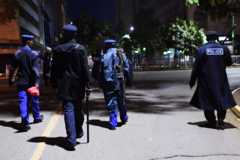
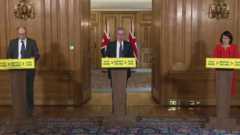
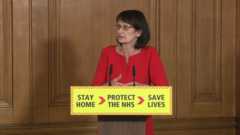

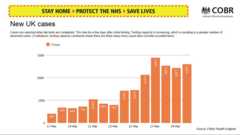
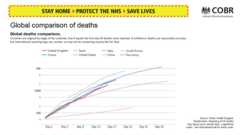
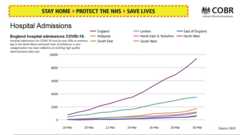
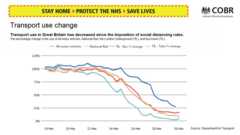
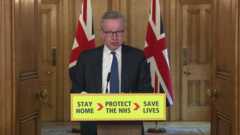
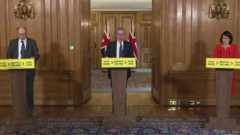
No comments:
Post a Comment